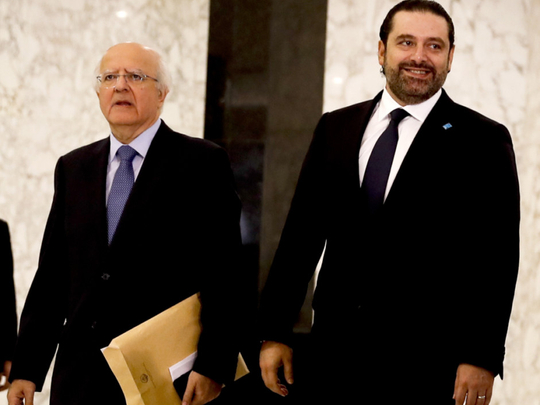
Yesterday’s foes are today’s friends. That sums up Lebanese politics. Despite the political doldrums, stalemates and even verbal annihilations, Lebanese politicians, of whatever sects and colourings, seem to have come together at the final hour and forged their swords into plough-shares.
The Lebanese presidential handshake and the final installing of Michel Aoun as President in Baabda Palace, after nearly two-and-a-half years of parliamentary deadlock, mark a crossroads for the wayward morass of politics in Lebanon. Despite the intractable way that Lebanon seems to have been assuaged and labyrinthed with the politics of the region, the Gulf, Iran and also internationally, the Lebanese have to be given a pat on the back for standing up and saying “enough is enough, we are going to choose a president, come what may”.
Of course, it was political will in the end. Aoun and Prime Minister Sa’ad Hariri stood their guard and came up with a formula basically saying — “I’ll take the presidency and you can be a prime minister” — which has characterised the way in which the country’s political leaders have been chosen since the 1940s, but has become increasingly difficult over the years.
It is political consensus that has suddenly prevailed, coming out of nowhere to bring two, three, four and even more ideologically opposed views and groups together. Finally, the stronger formations among them agreed to set aside their differences and try their hands at ruling the country. What happened in the electing of a Maronite president with the support of Shiite Hezbollah and forged by a Sunni prime minister, who is still putting together his Cabinet, can only be seen as a typically Lebanese way of doing things and nothing else.
Of course, this doesn’t mean the end of the road, it’s not the end of another chapter either. Aoun himself, judging from past meanderings, is not going to be a lame-duck President, despite his age (81) and in spite of his predecessors. He wants to bring about a revival of Christian power and vote, which he says has long been sidelined by the 1989 Taif Agreement and which shifted the weight of political power in favour of a Sunni prime minister and a Shiite Speaker of the parliament. Regardless of the actual day-to-day run-of-the-mill affairs, he wants the Christians to have a higher standing in the Lebanese pecking order despite the fact that their numbers over the years — and because of the 15-year civil war — have dwindled as migration to other countries has increased.
A charismatic person
It is a dream come true for Aoun, but how he grapples with the situation and his responsibilities in the next six years is what many will be watching for. Notwithstanding the Hezbollah support since 2006 — which he still refuses to term as a strategic alliance, but a tactical one — and his proven determination to become president since May 2014, when the office fell vacant, Aoun’s character is that of an old fox. He is known for his independence, he has a maverick reputation, he is stubborn, a charismatic person, but one with a temper. At least this is what many say of the military general who could probably prove to be an ace for Lebanese and Arab politics for that matter.
All his character traits may certainly prove Aoun will not take stick from anyone — not his allies, states known to meddle in Lebanese affairs, his political proteges, his rivals in parliament or his Muslim friends. He is courting the spirit of the politics of revivalism. It also speaks much about the old and trusted adage: Keep your friends close but your enemies closer.
Whatever may be the outcome now, it is making the wheels of Lebanese politics turn: Aoun’s Free Patriotic Front and Hariri’s Future Movement have strong heels in parliament and a strong following. Other parties, including Christians and Sunnis, may still feel heartbroken by the new arrangement, but they probably can’t do anything about it. The momentum for a new political stage has finally been set — sweeping them along as well.
What awaits the new Cabinet, provided it is formed quickly, are pressing parliamentary business and legislations that were allowed to rot by the wayside as session after session, 45 in all, were held to choose a president, but had to be disbanded because there was no quorum and Aoun and his Hezbollah supporters were blamed for the bedlam. The latter, in a new arrangement under the Hariri government, is likely to make a comeback, demanding its pound of the flesh in terms of ministerial berths. It is likely to have its way, but at what cost and how will it now manoeuvre its presence in Syria remain to be seen. There is much more to be untangled, but Lebanese politicians are perhaps playing it one step at a time.
Marwan Asmar is a commentator based in Amman. He has long worked in journalism and has a PhD in Political Science from Leeds University in the UK.









